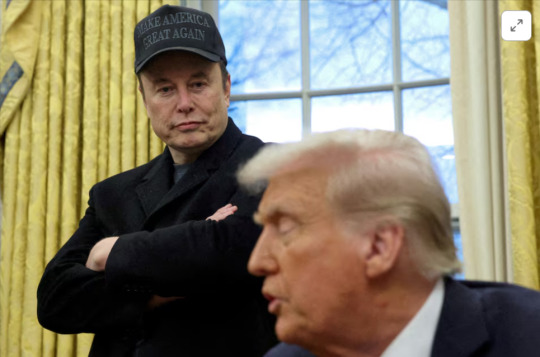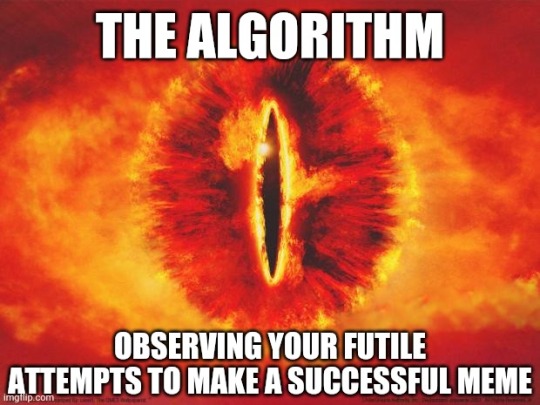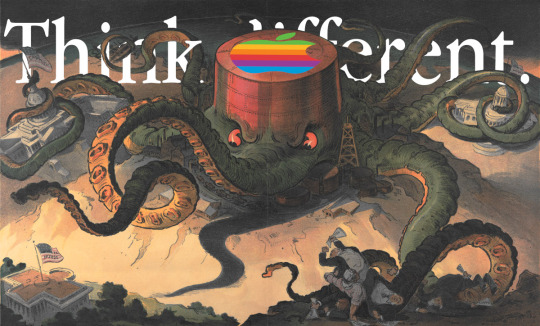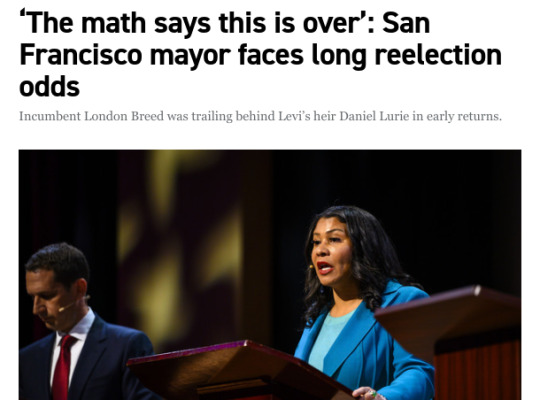#Big Tech corruption
Explore tagged Tumblr posts
Text
22 notes
·
View notes
Text
Gatekeepers or Collaborators?
Google and YouTube In an era where information is power, the world’s most powerful search engine and video platform stand accused of something darker than monopoly—collaboration with authoritarian regimes, algorithmic censorship, and even the erasure of history, such as grassroots movements like Occupy Chicago. 1. Censorship and Complicity with Authoritarianism Google’s development of Project…
#algorithmic bias#authoritarian collaboration#Big Tech corruption#CCP influence#data privacy#digital rights#erasure of history#Freedom of Speech#google censorship#internet freedom#Occupy Chicago#Project Dragonfly#surveillance capitalism#tech monopolies#YouTube shadow banning
0 notes
Text
Canada sues Google

If you'd like an essay-formatted version of this post to read or share, here's a link to it on pluralistic.net, my surveillance-free, ad-free, tracker-free blog:
https://pluralistic.net/2024/12/03/clementsy/#can-tech

For a country obsessed with defining itself as "not America," Canada sure likes to copy US policies, especially the really, really terrible policies – especially the really, really, really terrible digital policies.
In Canada's defense: these terrible US policies are high priority for the US Trade Representative, who leans on Canadian lawmakers to ensure that any time America decides to collectively jump off the Empire State Building, Canadian politicians throw us all off the CN Tower. And to Canada's enduring shame, the USTR never has to look very hard to find a lickspittle who's happy to sell Canadians out.
Take anti-circumvention. In 1998, Bill Clinton signed the Digital Millennium Copyright Act, a gnarly hairball of copyright law whose Section 1201 bans reverse-engineering for any purpose. Under DMCA 1201, "access controls" for copyrighted works are elevated to sacred status, and it's a felony (punishable by a five-year prison sentence and a $500k fine) to help someone bypass these access controls.
That's pretty esoteric, even today, and in 1998, it was nearly incomprehensible, except to a small group of extremely alarmed experts who ran around trying to explain to lawmakers why they should not vote for this thing. But by the time Tony Clement and James Moore (Conservative ministers in the Harper regime) introduced a law to import America's stupidest tech idea and paste it into Canada's lawbooks in 2012, the evidence against anti-circumvention was plain for anyone to see.
Under America's anti-circumvention law, any company that added an "access control" to its products instantly felonised any modification to that product. For example, it's not illegal to refill an ink cartridge, but it is illegal to bypass the access control that gets the cartridge to recognise that it's full and start working again. It's not illegal for a Canadian software developer to sell a Canadian Iphone owner an app without cutting Apple in for a 30% of the sale, but it is illegal to mod that Iphone so that it can run apps without downloading them from the App Store first. It's not illegal for a Canadian mechanic to fix a Canadian's car, but it is illegal for that mechanic to bypass the access controls that prevent third-party mechanics from decrypting the error codes the car generates.
We told Clement and Moore about this, and they ignored us. Literally: when they consulted on their proposal in 2010, we filed 6,138 comments explaining why this was a bad idea, while only 53 parties wrote in to support it. Moore publicly announced that he was discarding the objections, on the grounds that they had come from "babyish" "radical extremists":
https://www.cbc.ca/news/science/copyright-debate-turns-ugly-1.898216
For more than a decade, we've had Clement and Moore's Made-in-America law tied to our ankles. Even when Canada copies some good ideas from the US (by passing a Right to Repair law), or even some very good ideas of its own (passing an interoperability law), Canadians can't use those new rights without risking prosecution under Clement and Moore's poisoned gift to the nation:
https://pluralistic.net/2024/11/15/radical-extremists/#sex-pest
"Not America" is a pretty thin basis for a political identity anyway. There's nothing wrong with copying America's good ideas (like Right to Repair). Indeed, when it comes to tech regulation, the US has had some bangers lately, like prosecuting US tech giants for violating competition law. Given that Canada overhauled its competition law this year, the country's well-poised to tackle America's tech giants.
Which is exactly what's happening! Canada's Competition Bureau just filed a lawsuit against Google over its ad-tech monopoly, which isn't merely a big old Privacy Chernobyl, but is also a massively fraudulent enterprise that rips off both advertisers and publishers:
https://www.reuters.com/technology/canadas-antitrust-watchdog-sues-google-alleging-anti-competitive-conduct-2024-11-28/
The ad-tech industry scoops up about 51 cents out of every dollar (in the pre-digital advertising world the net take by ad agencies was more like 15%). Fucking up Google's ad-tech rip off is a much better way to Canada's press paid than the link tax the country instituted in 2023:
https://www.eff.org/deeplinks/2023/05/save-news-we-must-ban-surveillance-advertising
After all, what tech steals from the news isn't content (helping people find the news and giving them a forum to discuss it is good) – tech steals news's money. Ad-tech is a giant ripoff. So is the app tax – the 30% Canadian newspapers have to kick up to the Google and Apple crime families every time a subscriber renews their subscriptions in an app. Using Canadian law to force tech to stop stealing the press's money is a way better policy than forcing tech to profit-share with the news. For tech to profit-share with the news, it has to be profitable, meaning that a profit-sharing press benefits from tech's most rapacious and extractive conduct, and rather than serving as watchdogs, they're at risk of being cheerleaders.
Smashing tech power is a better policy than forcing tech to share its stolen loot with newspapers. For one thing, it gets government out of the business of deciding what is and isn't a legit news entity. Maybe you're OK with Trudeau making that call (though I'm not), but how will you feel when PM Polievre decides that Great Replacement-pushing, conspiracy-addled far right rags should receive a subsidy?
Taking on Google is a slam-dunk, not least because the US DoJ just got through prosecuting the exact same case, meaning that Canadian competition enforcers can do some good copying of their American counterparts – like, copying the exhibits, confidential memos, and successful arguments the DoJ brought before the court:
https://www.justice.gov/opa/pr/justice-department-sues-google-monopolizing-digital-advertising-technologies
Indeed, this already a winning formula! Because Big Tech commits the same crimes in every jurisdiction, trustbusters are doing a brisk business by copying each others' cases. The UK Digital Markets Unit released a big, deep market study into Apple's app market monopoly, which the EU Commission used as a roadmap to bring a successful case. Then, competition enforcers in Japan and South Korea recycled the exhibits and arguments from the EU's case to bring their own successful prosecutions:
https://pluralistic.net/2024/04/10/an-injury-to-one/#is-an-injury-to-all
Canada copying the DoJ's ad-tech case is a genius move – it's the kind of south-of-the-border import that Canadians need. Though, of course, it's a long shot that the Trump regime will produce much more worth copying. Instead, Trump has vowed to slap a 25% tariff on Canadian goods as of January 20.
Which is bad news for Canada's export sector, but it definitely means that Canada no longer has to worry about keeping the US Trade Rep happy. Repealing Clement and Moore's Bill C-11 should be Parliament's first order of business. Tariff or no tariff, Canadian tech entrepreneurs could easily export software-based repair diagnostic tools, Iphone jailbreaking tooks, alternative firmware for tractors and medical implants, and alternative app stores for games consoles, phones and tablets. So long as they can accept a US payment, they can sell to US customers. This is a much bigger opportunity than, say, selling cheap medicine to Americans trying to escape Big Pharma's predation.
What's more, there's no reason this couldn't be policy under Polievre and the Tories. After all, they're supposed to be the party of "respect for private property." What could be more respectful of private property than letting the owners of computers, phones, cars, tractors, printers, medical implants, smart speakers and anything else with a microchip decide for themselves how they want to it work? What could be more respectful of copyright than arranging things so that Canadian copyright holders – like a games studio or an app company – can sell their copyrighted works to Canadian buyers, without forcing the data and the payment to make a round trip through Silicon Valley and come back 30% lighter?
Canadian politicians have bound the Canadian public and Canadian industry to onerous and expensive obligations under treaties like the USMCA (AKA NAFTA2), on promise of tariff-free access to American markets. With that access gone, why on Earth would we continue to voluntarily hobble ourselves?
#pluralistic#link tax#big tech#corruption#canpoli#cdnpoli#monopolies#ad-tech#publishing#canada#competition bureau#usmca#nafta#anticircumvention#r2r#right to repair#interoperability
273 notes
·
View notes
Text

Exclusive: DOGE staffer 'Big Balls' provided tech support to cybercrime ring, records show
#DOGE staffer#'Big Balls'#provided tech support to cybercrime ring#the criminals digging into our data#maga corruption
13 notes
·
View notes
Text
I'm just saying maybe you shouldn't talk about the Luddites if you actually refuse to engage with their historical struggle and the reasons for it and instead just perpetuate the bourgeois propaganda about them and somehow act that's the materialist take. get fucking serious please.
#swear MLs on here really do love to be contrarian instead of having actual material analysis#like I'm not saying every anti-AI take is a coming from a rational and sober class analysis#but being against an anti-ai sentiment because there is a popular swell of it and so it must be stupid#and then defending that stance as politically justified in part by denouncing people as luddites#and then when ppl tell you about *the actual class character of the luddite movement* and why it's relevant to a marxist tech crit today#and how the modern definition is a bourgeois corruption to poison the well against a genuine threat to rising industrial capitalism#... your response is 'well that's how people understand it today. luddism is a step away from anti-civ reactionaries'#WHO IS REJECTING A HISTORICAL MATERIALIST ANALYSIS HERE?#sipping on the idealism of bourgeois propaganda against actual working class revolt and calling that a materialist political program?#grow up.#meanwhile WHO ARE YOU BENEFITING?#what infrastructure consolidation are you defending???#what energy grid privatisation and calcification are you cheering? do you think that's actually going to be good for us??? ever????#fucking unserious ass people - some technology is a systematic harm!#some technology was made by capitalists for capitalist ends! and will never benefit the working class bc it was created specifically not to#you have to be able to use your big brained material analysis to understand the class character of technology!#otherwise what even is the fucking point of you#sometimes it's not something that would be good just bc the workers are running it!#GROW UP
7 notes
·
View notes
Text
youtube
Trump is giving soldiers who refused the death jab back their jobs with full back pay! Awesome.
Nice to have businessman back in charge instead of the pseudo intellectual "elite" idealogues.
#Corruption#New Age#Trump#Us politics#Unification#Peace#Peace makers#Youtube#Biden#Presidency#Leftists#Leftism#Freedom of speech#Censorship#Anticensorship#Drain the swamp#Maga#Common man#For the people#We the people#E pluribus unum#Big tech#Election#Conspiracy#Collusion#Leftist Conspiracy#Collectivism#Collectivists#Military#Veterans
3 notes
·
View notes
Text

Can you explain to a stupid, mentally ill crazy house wife why the fuck for billions of dollars if I ask Google or whomever to never show me a site again it still does? Are you fucking morons?
I don't want to know WTF the Kardashian family is doing. How many decades can I say it asshole?
You pollute everything. Even the minds of children.
Narcissistic useless assholes.
This is why people say tech bro with disgust.
Sincerely can I fucking go home to place where none of you incompetent cowards live ?
That can't be too hard to manage.
3 notes
·
View notes
Text
been thinking about the neglected section of dagger's lore after he leaves the bakkers as a teen and winds up in a smuggler outfit and aaaa for so long i couldn't grasp details of it all but now its flooding in and its coming together :ratscream:
#like. imagining this very old school set of self-reliant outlaws#they have a hq base on a farm where they grow their own food and even have horses (rare and stolen ofc)#very low-tech#the leader was originally a man but gd that was stupid it's obviously gotta be a big buff old badass lady#dagger would never willingly take orders from a dude (daddy issues) and thats a big reason he hates being in the clan#but he would look at this woman and what she does with a little bit of awe and a lot of respect#and the farm brings back nostalgia from his childhood even though so much of it was bad its something he subconciously longs for. some kind#of stability. and he knows how to work because of it and that puts him in good graces right off the bat#he's used to being low tech its natural for him#and this is where he starts his love of knives#guns are a hassle they rely on ammo they're heavy and bulky and hackable but knives are pure fight and skill#and so visceral. and he learns how to fight and has a love affair with close combat and pain and blood and sweat and dirt#but it starts to corrupt him a little bit. he cares less about the jobs and more about causing pain and feeling pain#so it falls apart of course but its a very integral part of his life
5 notes
·
View notes
Text
Trump Supporter Given PRISON TIME Over 2016 Hillary Clinton Meme!
youtube
10 notes
·
View notes
Text
The antitrust case against Apple

I'm on tour with my new, nationally bestselling novel The Bezzle! Catch me TONIGHT (Mar 22) in TORONTO, then SUNDAY (Mar 24) with LAURA POITRAS in NYC, then Anaheim, and beyond!

The foundational tenet of "the Cult of Mac" is that buying products from a $3t company makes you a member of an oppressed ethnic minority and therefore every criticism of that corporation is an ethnic slur:
https://pluralistic.net/2024/01/12/youre-holding-it-wrong/#if-dishwashers-were-iphones
Call it "Apple exceptionalism" – the idea that Apple, alone among the Big Tech firms, is virtuous, and therefore its conduct should be interpreted through that lens of virtue. The wellspring of this virtue is conveniently nebulous, which allows for endless goal-post shifting by members of the Cult of Mac when Apple's sins are made manifest.
Take the claim that Apple is "privacy respecting," which is attributed to Apple's business model of financing its services though cash transactions, rather than by selling it customers to advertisers. This is the (widely misunderstood) crux of the "surveillance capitalism" hypothesis: that capitalism is just fine, but once surveillance is in the mix, capitalism fails.
Apple, then, is said to be a virtuous company because its behavior is disciplined by market forces, unlike its spying rivals, whose ability to "hack our dopamine loops" immobilizes the market's invisible hand with "behavior-shaping" shackles:
http://pluralistic.net/HowToDestroySurveillanceCapitalism
Apple makes a big deal out of its privacy-respecting ethos, and not without some justification. After all, Apple went to the mattresses to fight the FBI when they tried to force Apple to introduced defects into its encryption systems:
https://www.eff.org/deeplinks/2018/04/fbi-could-have-gotten-san-bernardino-shooters-iphone-leadership-didnt-say
And Apple gave Ios users the power to opt out of Facebook spying with a single click; 96% of its customers took them up on this offer, costing Facebook $10b (one fifth of the pricetag of the metaverse boondoggle!) in a single year (you love to see it):
https://arstechnica.com/gadgets/2021/02/facebook-makes-the-case-for-activity-tracking-to-ios-14-users-in-new-pop-ups/
Bruce Schneier has a name for this practice: "feudal security." That's when you cede control over your device to a Big Tech warlord whose "walled garden" becomes a fortress that defends you against external threats:
https://pluralistic.net/2021/06/08/leona-helmsley-was-a-pioneer/#manorialism
The keyword here is external threats. When Apple itself threatens your privacy, the fortress becomes a prison. The fact that you can't install unapproved apps on your Ios device means that when Apple decides to harm you, you have nowhere to turn. The first Apple customers to discover this were in China. When the Chinese government ordered Apple to remove all working privacy tools from its App Store, the company obliged, rather than risk losing access to its ultra-cheap manufacturing base (Tim Cook's signal accomplishment, the one that vaulted him into the CEO's seat, was figuring out how to offshore Apple manufacturing to China) and hundreds of millions of middle-class consumers:
https://www.reuters.com/article/us-china-apple-vpn/apple-says-it-is-removing-vpn-services-from-china-app-store-idUSKBN1AE0BQ
Killing VPNs and other privacy tools was just for openers. After Apple caved to Beijing, the demands kept coming. Next, Apple willingly backdoored all its Chinese cloud services, so that the Chinese state could plunder its customers' data at will:
https://www.nytimes.com/2021/05/17/technology/apple-china-censorship-data.html
This was the completely foreseeable consequence of Apple's "curated computing" model: once the company arrogated to itself the power to decide which software you could run on your own computer, it was inevitable that powerful actors – like the Chinese Communist Party – would lean on Apple to exercise that power in service to its goals.
Unsurprisingly, the Chinese state's appetite for deputizing Apple to help with its spying and oppression was not sated by backdooring iCloud and kicking VPNs out of the App Store. As recently as 2022, Apple continued to neuter its tools at the behest of the Chinese state, breaking Airdrop to make it useless for organizing protests in China:
https://pluralistic.net/2022/11/11/foreseeable-consequences/#airdropped
But the threat of Apple turning on its customers isn't limited to China. While the company has been unwilling to spy on its users on behalf of the US government, it's proven more than willing to compromise its worldwide users' privacy to pad its own profits. Remember when Apple let its users opt out of Facebook surveillance with one click? At the very same time, Apple was spinning up its own commercial surveillance program, spying on Ios customers, gathering the very same data as Facebook, and for the very same purpose: to target ads. When it came to its own surveillance, Apple completely ignored its customers' explicit refusal to consent to spying, spied on them anyway, and lied about it:
https://pluralistic.net/2022/11/14/luxury-surveillance/#liar-liar
Here's the thing: even if you believe that Apple has a "corporate personality" that makes it want to do the right thing, that desire to be virtuous is dependent on the constraints Apple faces. The fact that Apple has complete legal and technical control over the hardware it sells – the power to decide who can make software that runs on that hardware, the power to decide who can fix that hardware, the power to decide who can sell parts for that hardware – represents an irresistible temptation to enshittify Apple products.
"Constraints" are the crux of the enshittification hypothesis. The contagion that spread enshittification to every corner of our technological world isn't a newfound sadism or indifference among tech bosses. Those bosses are the same people they've always been – the difference is that today, they are unconstrained.
Having bought, merged or formed a cartel with all their rivals, they don't fear competition (Apple buys 90+ companies per year, and Google pays it an annual $26.3b bribe for default search on its operating systems and programs).
Having captured their regulators, they don't fear fines or other penalties for cheating their customers, workers or suppliers (Apple led the coalition that defeated dozens of Right to Repair bills, year after year, in the late 2010s).
Having wrapped themselves in IP law, they don't fear rivals who make alternative clients, mods, privacy tools or other "adversarial interoperability" tools that disenshittify their products (Apple uses the DMCA, trademark, and other exotic rules to block third-party software, repair, and clients).
True virtue rests not merely in resisting temptation to be wicked, but in recognizing your own weakness and avoiding temptation. As I wrote when Apple embarked on its "curated computing" path, the company would eventually – inevitably – use its power to veto its customers' choices to harm those customers:
https://memex.craphound.com/2010/04/01/why-i-wont-buy-an-ipad-and-think-you-shouldnt-either/
Which is where we're at today. Apple – uniquely among electronics companies – shreds every device that is traded in by its customers, to block third parties from harvesting working components and using them for independent repair:
https://www.vice.com/en/article/yp73jw/apple-recycling-iphones-macbooks
Apple engraves microscopic Apple logos on those parts and uses these as the basis for trademark complaints to US customs, to block the re-importation of parts that escape its shredders:
https://repair.eu/news/apple-uses-trademark-law-to-strengthen-its-monopoly-on-repair/
Apple entered into an illegal price-fixing conspiracy with Amazon to prevent used and refurbished devices from being sold in the "world's biggest marketplace":
https://pluralistic.net/2022/11/10/you-had-one-job/#thats-just-the-as
Why is Apple so opposed to independent repair? Well, they say it's to keep users safe from unscrupulous or incompetent repair technicians (feudal security). But when Tim Cook speaks to his investors, he tells a different story, warning them that the company's profits are threatened by customers who choose to repair (rather than replace) their slippery, fragile glass $1,000 pocket computers (the fortress becomes a prison):
https://www.apple.com/newsroom/2019/01/letter-from-tim-cook-to-apple-investors/
All this adds up to a growing mountain of immortal e-waste, festooned with miniature Apple logos, that our descendants will be dealing with for the next 1,000 years. In the face of this unspeakable crime, Apple engaged in a string of dishonest maneuvers, claiming that it would support independent repair. In 2022, Apple announced a home repair program that turned out to be a laughably absurd con:
https://pluralistic.net/2022/05/22/apples-cement-overshoes/
Then in 2023, Apple announced a fresh "pro-repair" initiative that, once again, actually blocked repair:
https://pluralistic.net/2023/09/22/vin-locking/#thought-differently
Let's pause here a moment and remember that Apple once stood for independent repair, and celebrated the independent repair technicians that kept its customers' beloved Macs running:
https://pluralistic.net/2021/10/29/norwegian-potato-flour-enchiladas/#r2r
Whatever virtue lurks in Apple's corporate personhood, it is no match for the temptation that comes from running a locked-down platform designed to capture IP rights so that it can prevent normal competitive activities, like fixing phones, processing payments, or offering apps.
When Apple rolled out the App Store, Steve Jobs promised that it would save journalism and other forms of "content creation" by finally giving users a way to pay rightsholders. A decade later, that promise has been shattered by the app tax – a 30% rake on every in-app transaction that can't be avoided because Apple will kick your app out of the App Store if you even mention that your customers can pay you via the web in order to avoid giving a third of their content dollars to a hardware manufacturer that contributed nothing to the production of that material:
https://www.eff.org/deeplinks/2023/06/save-news-we-must-open-app-stores
Among the apps that Apple also refuses to allow on Ios is third-party browsers. Every Iphone browser is just a reskinned version of Apple's Safari, running on the same antiquated, insecure Webkit browser engine. The fact that Webkit is incomplete and outdated is a feature, not a bug, because it lets Apple block web apps – apps delivered via browsers, rather than app stores:
https://pluralistic.net/2022/12/13/kitbashed/#app-store-tax
Last month, the EU took aim at Apple's veto over its users' and software vendors' ability to transact with one another. The newly in-effect Digital Markets Act requires Apple to open up both third-party payment processing and third-party app stores. Apple's response to this is the very definition of malicious compliance, a snake's nest of junk-fees, onerous terms of service, and petty punitive measures that all add up to a great, big "Go fuck yourself":
https://pluralistic.net/2024/02/06/spoil-the-bunch/#dma
But Apple's bullying, privacy invasion, price-gouging and environmental crimes are global, and the EU isn't the only government seeking to end them. They're in the firing line in Japan:
https://asia.nikkei.com/Business/Technology/Japan-to-crack-down-on-Apple-and-Google-app-store-monopolies
And in the UK:
https://www.gov.uk/government/news/cma-wins-appeal-in-apple-case
And now, famously, the US Department of Justice is coming for Apple, with a bold antitrust complaint that strikes at the heart of Apple exceptionalism, the idea that monopoly is safer for users than technological self-determination:
https://www.justice.gov/opa/media/1344546/dl?inline
There's passages in the complaint that read like I wrote them:
Apple wraps itself in a cloak of privacy, security, and consumer preferences to justify its anticompetitive conduct. Indeed, it spends billions on marketing and branding to promote the self-serving premise that only Apple can safeguard consumers’ privacy and security interests. Apple selectively compromises privacy and security interests when doing so is in Apple’s own financial interest—such as degrading the security of text messages, offering governments and certain companies the chance to access more private and secure versions of app stores, or accepting billions of dollars each year for choosing Google as its default search engine when more private options are available. In the end, Apple deploys privacy and security justifications as an elastic shield that can stretch or contract to serve Apple’s financial and business interests.
After all, Apple punishes its customers for communicating with Android users by forcing them to do so without any encryption. When Beeper Mini rolled out an Imessage-compatible Android app that fixed this, giving Iphone owners the privacy Apple says they deserve but denies to them, Apple destroyed Beeper Mini:
https://blog.beeper.com/p/beeper-moving-forward
Tim Cook is on record about this: if you want to securely communicate with an Android user, you must "buy them an Iphone":
https://www.theverge.com/2022/9/7/23342243/tim-cook-apple-rcs-imessage-android-iphone-compatibility
If your friend, family member or customer declines to change mobile operating systems, Tim Cook insists that you must communicate without any privacy or security.
Even where Apple tries for security, it sometimes fails ("security is a process, not a product" -B. Schneier). To be secure in a benevolent dictatorship, it must also be an infallible dictatorship. Apple's far from infallible: Eight generations of Iphones have unpatchable hardware defects:
https://checkm8.info/
And Apple's latest custom chips have secret-leaking, unpatchable vulnerabilities:
https://arstechnica.com/security/2024/03/hackers-can-extract-secret-encryption-keys-from-apples-mac-chips/
Apple's far from infallible – but they're also far from benevolent. Despite Apple's claims, its hardware, operating system and apps are riddled with deliberate privacy defects, introduce to protect Apple's shareholders at the expense of its customers:
https://proton.me/blog/iphone-privacy
Now, antitrust suits are notoriously hard to make, especially after 40 years of bad-precedent-setting, monopoly-friendly antitrust malpractice. Much of the time, these suits fail because they can't prove that tech bosses intentionally built their monopolies. However, tech is a written culture, one that leaves abundant, indelible records of corporate deliberations. What's more, tech bosses are notoriously prone to bragging about their nefarious intentions, committing them to writing:
https://pluralistic.net/2023/09/03/big-tech-cant-stop-telling-on-itself/
Apple is no exception – there's an abundance of written records that establish that Apple deliberately, illegally set out to create and maintain a monopoly:
https://www.wired.com/story/4-internal-apple-emails-helped-doj-build-antitrust-case/
Apple claims that its monopoly is beneficent, used to protect its users, making its products more "elegant" and safe. But when Apple's interests conflict with its customers' safety and privacy – and pocketbooks – Apple always puts itself first, just like every other corporation. In other words: Apple is unexceptional.
The Cult of Mac denies this. They say that no one wants to use a third-party app store, no one wants third-party payments, no one wants third-party repair. This is obviously wrong and trivially disproved: if no Apple customer wanted these things, Apple wouldn't have to go to enormous lengths to prevent them. The only phones that an independent Iphone repair shop fixes are Iphones: which means Iphone owners want independent repair.
The rejoinder from the Cult of Mac is that those Iphone owners shouldn't own Iphones: if they wanted to exercise property rights over their phones, they shouldn't have bought a phone from Apple. This is the "No True Scotsman" fallacy for distraction-rectangles, and moreover, it's impossible to square with Tim Cook's insistence that if you want private communications, you must buy an Iphone.
Apple is unexceptional. It's just another Big Tech monopolist. Rounded corners don't preserve virtue any better than square ones. Any company that is freed from constraints – of competition, regulation and interoperability – will always enshittify. Apple – being unexceptional – is no exception.

Name your price for 18 of my DRM-free ebooks and support the Electronic Frontier Foundation with the Humble Cory Doctorow Bundle.

If you'd like an essay-formatted version of this post to read or share, here's a link to it on pluralistic.net, my surveillance-free, ad-free, tracker-free blog:
https://pluralistic.net/2024/03/22/reality-distortion-field/#three-trillion-here-three-trillion-there-pretty-soon-youre-talking-real-money
#pluralistic#apple#antitrust#cult of mac#ios#mobile#app tax#infosec#feudal security#doj#jonathan kanter#doj v apple#big tech#trustbusting#monopolies#app stores#technofeudalism#technomaorialism#privacy#right to repair#corruption
239 notes
·
View notes
Text
#American Privacy Rights Act#APRA#Big Pharma#Big Tech#Consumer Rights#Corporate Greed#Corporate Influence#Data Privacy#Digital Freedom#facts#Financial Deregulation#Government Corruption#Internet Control#life#Lobbying#Online Privacy#Podcast#Political Manipulation#serious#straight forward#Surveillance#Telecom Monopoly#truth#upfront#Wall Street#website
0 notes
Text

Patterns are patterning.
#i'm not the biggest fan of breed#i think she's made some big mistakes playing into rightwing narratives about san francisco#and she's more centrist than me and there are some corruption issues#but seeing another woman of color who has basically been a career public servant defeated by inherited wealth is uggggh#the tech money in the city is really pushing politics in a scary direction#so many people want to live in the disneyland version of the quirky city they moved to in 2014 not realizing they killed it
0 notes
Text

Back when we started Ellipsus (it's been eighty-four years… or two, but it sure feels like forever), we encountered generative AI.
Immediately, we realized LLMs were the antithesis of creativity and community, and the threat they posed to genuine artistic expression and collaboration. (P.S.: we have a lot to say about it.)
Since then, writing tools—from big tech entities like Google Docs and Microsoft Word, to a host of smaller platforms and publishers—have rapidly integrated LLMs, looking to capitalize on the novelty of generative AI. Now, our tools are failing us, corrupted by data-scraping and hostile to users' consent and IP ownership.
The future of creative work requires a nuanced understanding of the challenges ahead, and a shared vision—writers for writers. We know we're stronger together. And in a rapidly changing world, we know that transparency is paramount.
So… some Ellipsus facts:
We will never include generative AI in Ellipsus.
We will never access your work without explicit consent, sell your data, or use your work for exploitative purposes.
We believe in the strength of creative communities and the stories they tell—and we want to foster a space in which writers can connect and tell their stories in freedom and safety—without compromise.
#ellipsus#writeblr#writing#writers on tumblr#collaborative writing#anti ai#writing tools#fanfiction#fanfic
10K notes
·
View notes
Text
Seeing people say it’s stupid to go into academic careers because “the market doesn’t pay” really makes me realize just how we got into this situation we’re in now. Maybe the reason everyone doesn’t care about history and politics and let tech bros run the world is because they’re stupid. They think the value of information is purely economic and not cultural. Elon Musk is the face of a big tech brand that makes big numbers so therefore he’s more suited to be one of the main faces in a global political and cultural campaign. Like no wonder your politicians don’t know anything about major cultural events that are crucial to the knowledge of current political and human issues. No wonder. They’re already banning books on “controversial” historical events. A disinterest in recording history and culture because it makes the 1% uncomfortable can only be a sign of a corrupt society. Boohoo it makes you feel icky when you have to admit to the atrocities that are apart of what made your country the way it is today. Facts over feelings!
#serious rants#the world is becoming stupider by the day and a lot of it has to do with an obsession with monetary gain over knowledge of history
2K notes
·
View notes
Text


1920s Edward Nygma, A.K.A -- The Riddler! ( I will try to make this one slightly more brief lmao ) ☆ ETSY // COMMISSIONS
So when it comes to the Riddler, ordinarily, I always struggle with him aesthetically, because he doesn't have as much obvious themeing as "southern halloween" or "the entirety of alice in wonderland", and so I knew I wanted to take advantage of how severely I am rearranging all the rogue's aesthetics to give the Riddler something specific and time period appropriate to visually do, yknow?
In my mind, when I think of the Riddler I think of... technically winnable but highly tilted competitions of wit. Almost like a rigged game. That, combined with a very cocky "wise ass" personality. So! I knew pretty early on I wanted him to be a carnival barker! ( Puzzles and riddles and things of that nature were more common as a pass-time back then ) I considered giving him a straw boater instead of his usual bowler hat... but the bowler hat is so iconic to him and time period appropriate, so I left it. I think it still gives carnival owner, tbh, just a little more greasy than cute. Which fits, frankly. Yes, so although carnival imagery is associated with the Joker, the Joker is, of course, a silent film comedian ( in loving homage to his origin ), thus freeing up the funhouse for Edward. Although, he's no clown, he's more the one making a fool out of you.
Edward Nygma, as an orphan immigrant of Irish descent, came to America with nothing but the clothes on his back and his eyes on that shining city on the hill, the beacon of opportunity, and above all-- the land of meritocracy. Of course, however, reality set in after he stepped foot off the boat. It also didn't help the city he set foot in was Gotham. Despite being an engineering prodigy befit the rapidly industrializing city of the future, he ran into bad luck after bad luck, constantly seeming to stumble on his way up the ladder as opportunities slipped away and seemed to be given to-- in his mind-- less deserving men. With his frustration mounting, and a compulsive mind that never seems to let him let any insults to his pride go, it all comes to a breaking point when one of Gotham's biggest corporations scams him out of the patent for one of his innovations. Its only then does he finally realize what the "land of opportunity" really means.
Giving up on the "honest man" approach, Edward resorts to cheap cons, eventually building enough success to open a carnival of games, mysteries, snake oil, and of course, riddles-- Taking on the performer name "The Riddler" as a face for the event. A big, shiny bauble to lure in the dumb masses to willingly fork up their money to him. After all, if they were stupid enough to fall for it, they deserve whatever happens to them. However, this was all a front for the far grander scheme he constructs to take down the company who wronged him all that time ago. Because who would ever suspect a two-bit carnie could be capable of such a thing?
But, careful as he was, stirring trouble that big was enough to bring the attention of the Bat, eventually-- of course-- leading to the reveal that the Riddler anticipated their arrival and turned his carnival into a puzzle laden death trap. Even though Batman wins, because of course, he does incidentally ( or perhaps on purpose ) reveal to the public that the Ed is the real genius behind his stolen tech, thus leaving Mr. Nygma laughing all the way to the mad house. Even if he still doesn't get to own the patent.
Edward has a more... modern and subtle mental illness, being his OCD and other symptoms, and I feel a corrupt 1920s mad house that only vaguely cares to cure its patients would struggle to even understand exactly what the source of his more erratic behavior is coming from. He's constantly tense, speaks a mile a minute and for long periods, and is prone to sudden and aggressive outbursts of anger. They will likely acknowledge he seems obsessive, hyperactive, and prone to grandiose thinking but consider him a less hopeless case compared to say, Jervis Tetch.
However, his alignment lands him squarely in the anti-society section, thus aligning him with his soon to be sometimes-partners in crime, Jonathan and Jervis.
#( I struggle with the color green.... its my least favorite color.... so you have to#tell me if his color palette is looking good because i physically just can't tell lmao )#fanart#batman#gotham rogues#batman villains#Edward Nygma#The Riddler#Batman Scarecrow#batman Mad Hatter#Jervis Tetch#Jonathan Crane
685 notes
·
View notes